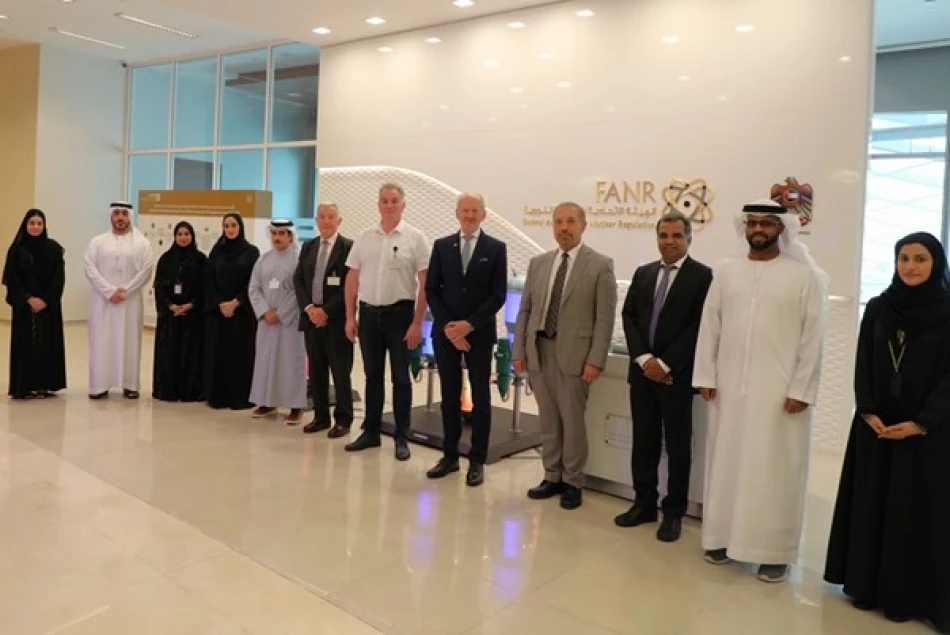
UAE Nuclear Regulator Hosts IAEA Inspection Mission
UAE Nuclear Authority Sets Global Benchmark with AI-Powered Knowledge Management System
The UAE Federal Authority for Nuclear Regulation has earned international recognition for developing one of the world's most sophisticated nuclear knowledge management frameworks, now integrating artificial intelligence to preserve critical expertise and support regulatory decisions. This positions the Emirates as a model for emerging nuclear nations while addressing the sector's persistent challenge of knowledge loss as experienced professionals retire.
International Validation of UAE's Nuclear Expertise
The International Atomic Energy Agency recently completed a comprehensive "Knowledge Management Support Mission – Level II" in Abu Dhabi, bringing together international experts to evaluate the UAE's nuclear and radiological knowledge management practices. This follow-up to a 2014 assessment focused on critical areas including policy frameworks, human resource development, knowledge transfer protocols, digital tools, and organizational culture around information sharing.
The mission's findings were striking: UAE's nuclear authority now operates one of the most integrated and robust knowledge management programs among global nuclear regulators, successfully maintaining ISO 30401:2018 certification—a distinction held by only a handful of nuclear regulatory bodies worldwide.
Strategic Response to Industry-Wide Challenge
The Knowledge Crisis in Nuclear Energy
Knowledge management represents a critical vulnerability across the global nuclear industry. As the generation that built the world's current nuclear infrastructure approaches retirement, utilities and regulators face the prospect of losing decades of operational wisdom and technical expertise. This "knowledge cliff" has already impacted countries like Japan and Germany, where nuclear expertise has eroded following policy shifts.
The UAE's proactive approach contrasts sharply with reactive strategies seen elsewhere. While established nuclear nations scramble to capture retiring experts' knowledge, the Emirates built comprehensive knowledge preservation systems from the ground up during its nuclear program development.
AI Integration: Beyond Traditional Documentation
The authority's next phase involves deploying artificial intelligence tools trained on "concept maps"—visual representations of expert decision-making processes and technical knowledge. This approach goes far beyond traditional documentation by capturing the reasoning patterns of experienced professionals, not just their conclusions.
These AI systems will provide real-time support to inspectors, analysts, and specialists, offering instant access to institutional expertise during critical regulatory decisions. The technology promises to bridge the gap between junior staff and seasoned experts, accelerating competency development while maintaining regulatory rigor.
Market and Strategic Implications
Competitive Advantage in Nuclear Services
The UAE's knowledge management excellence positions it favorably in the expanding global nuclear market. As countries like Poland, Egypt, and Bangladesh develop nuclear programs, they increasingly look to successful newcomers rather than established but aging nuclear powers for guidance and services.
With nearly 20,000 nuclear and radiological specialists nationwide and 78% Emirati representation within the regulatory authority—including 44% female leadership—the UAE demonstrates that emerging nuclear nations can rapidly develop indigenous expertise while maintaining international standards.
Regional Leadership Implications
This achievement reinforces the UAE's broader strategy of becoming the Middle East's technology and innovation hub. Similar to how Singapore positioned itself as Asia's financial center through regulatory excellence, the Emirates appears to be establishing itself as the region's nuclear expertise center.
The timing proves particularly strategic as Saudi Arabia, Turkey, and other regional powers advance their own nuclear ambitions. The UAE's demonstrated regulatory sophistication and knowledge management capabilities could translate into consulting opportunities and technology partnerships across the region.
Innovation in Practice
Communities of Practice and Collaborative Learning
The IAEA mission emphasized expanding "communities of practice"—structured networks where professionals in similar roles regularly share knowledge and collaborate on challenges. This approach, proven effective in organizations like NASA and major consulting firms, creates multiple pathways for knowledge preservation and transfer.
The authority's systematic approach to lessons learned and proactive identification of knowledge gaps demonstrates institutional maturity typically associated with decades-old regulatory bodies, not organizations established within the past fifteen years.
Global Implications for Nuclear Governance
The UAE's success challenges conventional assumptions about nuclear program development timelines and knowledge acquisition. Traditional nuclear powers required decades to develop sophisticated regulatory frameworks, often learning through operational experience and, occasionally, accidents.
The Emirates' achievement suggests that newcomer nations, by leveraging modern knowledge management techniques and international best practices from the outset, may actually develop more resilient and adaptable regulatory systems than their established counterparts.
As the global nuclear industry experiences renewed growth driven by climate commitments and energy security concerns, the UAE model offers a replicable framework for rapid, safe nuclear program development—potentially accelerating the technology's deployment worldwide while maintaining the highest safety standards.
Most Viewed News

 Layla Al Mansoori
Layla Al Mansoori






